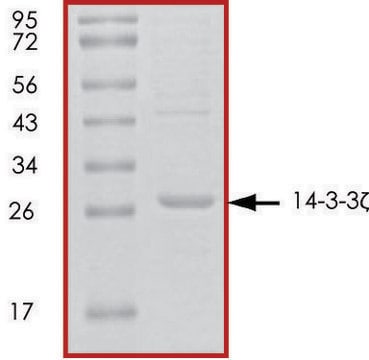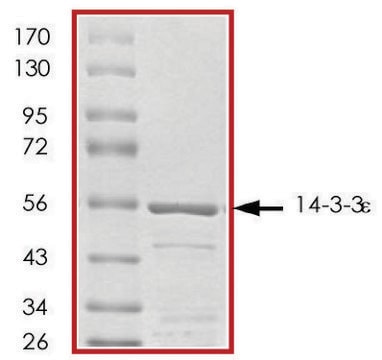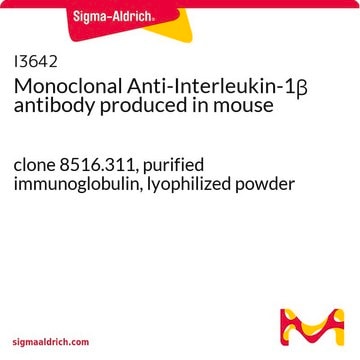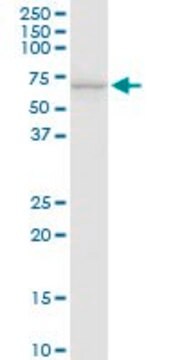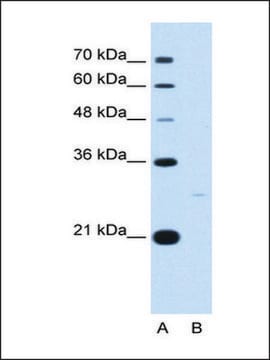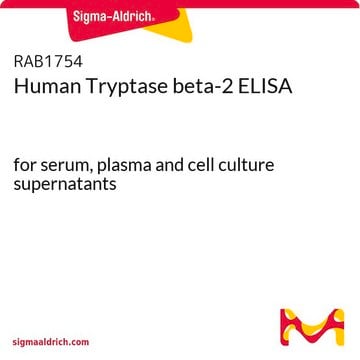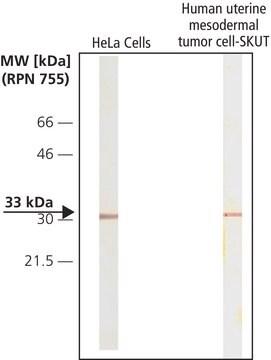SRP5155
14-3-3 ζ, GST tagged human
recombinant, expressed in baculovirus infected Sf9 cells, ≥70% (SDS-PAGE), buffered aqueous glycerol solution
Synonym(s):
KCIP-1, MGC111427, MGC126532, MGC138156, YWHAZ
Sign Into View Organizational & Contract Pricing
All Photos(1)
About This Item
Recommended Products
biological source
human
recombinant
expressed in baculovirus infected Sf9 cells
Assay
≥70% (SDS-PAGE)
form
buffered aqueous glycerol solution
mol wt
~55 kDa
NCBI accession no.
application(s)
cell analysis
shipped in
dry ice
storage temp.
−70°C
Gene Information
human ... YWHAZ(7534)
General description
14-3-3ζ (also known as tyrosine 3-monooxygenase/tryptophan 5-monooxygenase activation protein, zeta polypeptide) is a member of the 14-3-3 family of proteins which mediate signal transduction by binding to phosphoserine-containing proteins. 14-3-3ζ protein plays a key role in cancer biology by being an important regulator of major cellular processes such as proliferation, differentiation, senescence and apoptosis. 14-3-3ζ protein has been shown to interact with the IRS1 protein, suggesting a role for this protein in regulating insulin sensitivity by interrupting the association between the insulin receptor and IRS1.
Physical form
Supplied in 50mM Tris-HCl, pH 7.5, 150mM NaCl, 10mM glutathione, 0.1mM EDTA, 0.25mM DTT, 0.1mM PMSF, 25% glycerol.
Preparation Note
after opening, aliquot into smaller quantities and store at -70 °C. Avoid repeating handling and multiple freeze/thaw cycles
Storage Class Code
10 - Combustible liquids
WGK
WGK 1
Flash Point(F)
Not applicable
Flash Point(C)
Not applicable
Certificates of Analysis (COA)
Search for Certificates of Analysis (COA) by entering the products Lot/Batch Number. Lot and Batch Numbers can be found on a product’s label following the words ‘Lot’ or ‘Batch’.
Already Own This Product?
Find documentation for the products that you have recently purchased in the Document Library.
Zenggang Li et al.
Proceedings of the National Academy of Sciences of the United States of America, 105(1), 162-167 (2007-12-29)
The family of 14-3-3 proteins has emerged as critical regulators of diverse cellular responses under both physiological and pathological conditions. Here, we report an important role of 14-3-3zeta in tumorigenesis through a mechanism that involves anoikis resistance. 14-3-3zeta is up-regulated
M Niemantsverdriet et al.
Oncogene, 27(9), 1315-1319 (2007-08-21)
14-3-3 proteins are relevant to cancer biology as they are key regulators of major cellular processes such as proliferation, differentiation, senescence and apoptosis. So far, the sigma isoform (14-3-3sigma) has most directly been implicated in carcinogenesis and was recognized as
Our team of scientists has experience in all areas of research including Life Science, Material Science, Chemical Synthesis, Chromatography, Analytical and many others.
Contact Technical Service